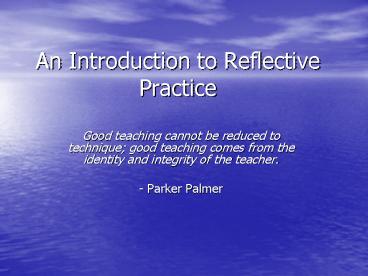An Introduction to Reflective Practice - PowerPoint PPT Presentation
1 / 24
Title:
An Introduction to Reflective Practice
Description:
... takes time.... Three Levels of Reflection (Van Manen, M., 1977) Level One ... What do I want to change for next time? When will I use this information? ... – PowerPoint PPT presentation
Number of Views:106
Avg rating:3.0/5.0
Title: An Introduction to Reflective Practice
1
An Introduction to Reflective Practice
- Good teaching cannot be reduced to technique
good teaching comes from the identity and
integrity of the teacher. - - Parker Palmer
2
Reflect or journal on the following questions
- What drew me to this class?
- What do I want others to know about my strengths
and weaknesses and learning style that would help
me to participate fully in this class?
3
- A good teacher does not fill the space so much as
open it up for others. - - Parker Palmer
4
Defining Reflective Practice.
- Reflective practice can be considered (small
group activity)
5
Reflective Practice according to York-Barr, J. et
al
- Reflective practice is a deliberate pause to
assume an open perspective, to allow for
higher-level thinking processes. Practitioners
use these processes for examining beliefs, goals,
and practices, to gain new or deeper
understandings that lead to actions that improve
learning for students (p. 6).
6
Forms of Reflective Practice(York-Barr, et al.,
2001)
7
Active reflection takes time.
- Three Levels of Reflection(Van Manen, M., 1977)
8
Level One(Technical Focus)
- Concern with the means rather that the results
of specific practices. Focus on technical
issues - Ex How do I use this technique or strategy?
9
Level Two Conceptual Focus
- Concerns with values drive interpretation of
actions and events in practice. - Ex If a teacher believes children learn best
through a cooperative learning approach, he/she
will tend to use methods that incorporate
cooperative learning instruction.
10
Level Three(Dialectical Focus)
- Consider the relationships between a specific
practice and the outcomes. - Ex In what ways will this practice influence
the development of student knowledge, skills,
and appreciation?
11
Steps for Reflection (York-Barr, J., et al.,
2001)
- Description What happened?
- What did I do?
- What did the students do?
- How was the environment constructed?
- What was the outcome?
12
Steps for Reflection (York-Barr, J., et al.,
2001)
- Analysis Why?
- Why do I think this happened?
- How did the outcome compare to my intended
outcome? - How did the environment influence the outcome?
- How did I influence the outcome?
- What factors contributed to the outcome?
- How would the outcome be different with different
factors?
13
Steps for Reflection (York-Barr, J., et al.,
2001)
- Meaning So What?
- What did I learn?
- How could I improve?
- How does this change my beliefs or my future
thinking? - What other questions do I have?
14
Steps for Reflection (York-Barr, J., et al.,
2001)
- Implication Now What?
- What do I want to change for next time?
- When will I use this information?
- How will I construct the environment?
- What will I design for my next steps?
- How will this improve my practice?
- What questions, factors, or practices do I want
to explore further?
15
Self Assessment Think, Pair, Share
- Reflect on your current reflective practice
- What are your priorities for your own
reflective practice (see text pp. 34 35)
16
Question
- What are some personal capacities that promote
reflection?
17
Effective Listening
- Paraphrase (repeat what you heard in your own
words) - Clarify (rephrase as a question to seek meaning)
- Summarize (rephrase main points)
- Ask questions (open, honest)
- Use non-verbal cues
- Validate (let the speaker know you heard what
they said and that you see their point of view) - Keep focused
- Silence
18
Providing Reflective Feedback
- Describe the behavior, not the person
- Use observations, avoid inferring
- Seek to understand, not to judge
- Provide questions, not answers
- Highlight ideas, not solutions
- Validate ideas, rather than oppose
- Feedback works best when it is solicited, if
they dont ask, dont tell.
19
Six Paradoxes of Space(Palmer, P., 2002)
- The space should be bounded and open.
- The space should be hospitable and charged
- The space should invite the voice of the
individual and the voice of the group - The space should honor the little stories of
the participants and the big stories of
teaching, learning, identity, and integrity - The space should support solitude and surround it
with the resources of the community - The space should welcome both silence and speech.
20
Small group focus question
How can we as a group develop an atmosphere of
trust building?
21
Ways to Reflect
- Individual
- Journaling
- Mapping
- Teacher Narratives
- Teacher Portfolios
- Metaphors
- Reading with Reflection
22
Ways to Reflect
- Partners
- Coaching
- Dialogue Journals
- Structured Dialogue
- Action Research
- Weekly Reviews
- Listening Practice
- Observation Learning
23
Ways to Reflect
- Small Groups
- Reading Reflection
- Metaphors
- Talking Cards
- Six Hats
- Think Tank
- Interactive Reflective Teaching
- Teacher Support Groups
- Teacher Dialogues
- Video/Book Clubs
- Reflective Roundtables
24
Ways to Reflect
- School-wide
- Coaching
- Learning in Faculty Meetings
- School-wide Study Groups
- Philosophy Club
- School Self-Review




























![get [PDF] Download Restorative Justice: Integrating Theory, Research, and Practice PowerPoint PPT Presentation](https://s3.amazonaws.com/images.powershow.com/10051415.th0.jpg?_=20240610029)

